Attempting to translate many African words into English wastes time, as in the silly translation of a Yorùbá Oba to His Imperial Majesty. Why not retain the inherited titles: Alaafin, Ooni, Ewi, Awujale, and stop the nonsense of translation and equivalences? What imperial? Where is the imperialism? Africans had been modest in history; they never developed the idea of kings who would go to Europe or Asia to conquer and impose imperial rule. How many empires did the modern Imperial Majesty conquer and create? Can someone who presides over a land that you can traverse its length and breadth within fifteen minutes, like some villages which they call towns, call himself “Imperial”? The city of Ibadan now has over a dozen “Imperial Majesties,” one within a distance of three miles!
Oh, someone just said it’s a way of attaching so much importance to them to fit the oversized agbádá they often wear. How funny?Very funny! And what “Majesty?” What is the meaning of “Imperial Majesty” in Yoruba? Majesty in the imperial court of women? (Are the wives enough to populate an empire?). How do you convert “His Royal Highness” back into Yorùbá or Igbo language? And is there “His Royal Lowness?” Yes, when you walk along with seven wives and stand in the middle, three to your left and four to your right, creating an imbalance that means you must marry the eighth. After the number eighth wife, we can test whether you are indeed an Imperial Majesty if you can do the private rounds with all the eight at one round per person. Don’t faint; it’s just a test, after all!
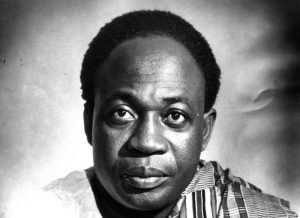
Kwame Nkrumah (1909-1972)
I laughed loud when one Kábíyèsí told me a story, in his palace (not more prominent than the BQ that the wealthy man who I know but whose name I cannot mention), about an armed robber who invaded him sat on his throne, and asked the King to put his crown on his head. His Imperial Majesty, without a police force, spies, archers, horses and cavalry, was trembling. How can an Imperial Majesty not have security details and a command structure? No General! Kábíyèsí obliged. The armed robber asked the King to salute him. Why won’t you salute your master, facing AK47? So, the juju that His Royal Highness claimed to have is a myth. Not at all; he only forgot the long incantation lines!
The King promptly prostrated to the armed robber, shouting Kábíyèsí, Aláyélúwà, Igbákejì Orìṣà. May your reign be long! The armed robber protested: Call me Kábíyèsí, the King of Boys, the Boss of Robbers! Wait o, is it not a taboo again for the King to prostrate before any other man? Well, maybe since my stroke, I have stopped drinking and can no longer think straight! Where is the ase that the King has? Ase, a word that commands. I would have sympathised if the King had called himself an Oba and not an Imperial Majesty.
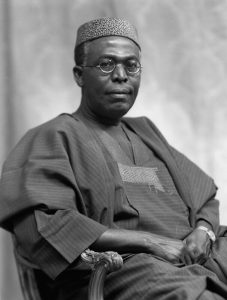
Obafemi Awolowo (1909-1987)
Let us demolish circumlocution so that we can arrive at the circumstances. There is no need to put a comma after a period! For a non-Yorùbá speaking person, you might want to look further for the meaning of Ìjọba but do not go to the palace. Ìjọba means “government” in a literary translation. The essence of the usage is drawn from the emphatic use of the word itself from the crust of Yorùbá socio-linguistic intentions. It was difficult to label the British colonial government; thus, they called it Ìjọba-Geesi—the government of Britons! After that, they simply put the name of a leader in front of Ìjọba, as in saying Ìjọba Tinubu. It is a complicated translation which masks the complexities of a label. You will surely understand when you read all the parts I am offering.
Government and leadership in any society are core to the development of such society and all parts forming the social structure. It is essential in the determination of contemporary phenomena, the preservation and usage of the past, and the trajectory of the future. Where a nation grows, there is a need for an ideologically motivated government and practically engaged one for it to coast towards that lane; however, if it falls, the government has always been core to it. We may not agree on using the word Ìjọba, but everyone would agree on the existence of government and societal roles.
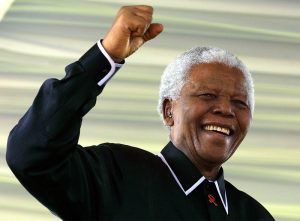
Nelson Mandela (1918- 2013)
Having agreed on the significance of the role of the government in the determination of the projection of every society, the Nigerian society has become a specimen for evaluating what a good leadership or government should be. The perspectival examination of the government depends on the general feelings and reinforcements coming from the people over the years. Although distrust in government and its institutions that form Ìjọba is a widespread phenomenon in Africa and a problem making waves, especially among countries facing different shades of challenges, Nigeria is a particular case study. To adequately finalise the question of the various impressions, this topic will be divided into four in this series: Òṣèlú, Ọjẹlú, Ọtàlú, and Ìjọbami, that is, privatised individuals who govern themselves. The four cover different political perspectives of the country’s different politicians. This part will be addressing Òṣèlú.
It seems the epistemological standing of the Yorùbá has given more trust and respect to the political elites far more than the current public evaluation of them. This is because the description of a politician in Yoruba is Olóṣèlú. Òṣèlú means the act of developing society and putting things in order. And Olóṣèlú is the person who does it. That should be the etymological conceptualisation of politicians, meaning those who make policies and decisions do so to improve the people’s affairs. However, the socio-linguistic understanding of politicians and Olóṣèlú in Nigeria has moved beyond the positive ascriptions the ordinary words mean. Olóṣèlú, in its original intended meaning, is optimistic: someone who uses power for the public good.
There is a repose of an expectation of corrupt practices, embezzlement, and low expectation of moral standing and good conscience of politicians in the country. When you hear one say, “he is a politician” or “he is Olóṣèlú“, it would not be surprising to people if you say, “God forbid,” or deny the description profusely in the country. Today, an Olóṣèlú has become a piece of thrash. The reason behind the notion is that the words of a politician are often supposed to be checked and rechecked over and over in contemporary society. It means you are a cunny, manipulative, and deceptive individual whose statements should be taken like a pinch of salt. You are a pathetic and consistent liar. You are a politician; You are Olóṣèlú.
You dey trust politicians? Dey Play!
The essence of this first part in my series of four is not to align with the contemporary socio-linguistic understandings that “politics and politicians,” Òṣèlú or Olóṣèlú, have taken but to reiterate the historical expectation of a politician and let them know that they have not changed. The Yorùbá culture and philosophies give high regard to the leaders and prepare the people to have similar expectations. It is the understanding of why it reposes all rights on the Supreme, including the right to the lives of its people. Ọba lónilẹ. The King is alásẹ èkejì òrìṣà, second only to the gods. He is titled Kábíyèsí, meaning he is unquestionable. There was the expectation of justice and fairness associated with an Oba and Olóṣèlú.
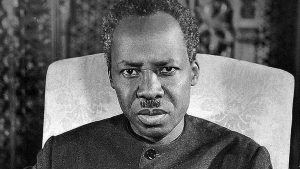
Mwalimu Julius Kambarage Nyerere (1922- 1999)
The Yorùbá leaders are given such respect because they are supposed to be a reservoir of the law, justice, and shared trust of the people. They hold in trust the collective values and heritage of the people. Orderliness, communal and collective development, customs, and justice are phenomena the Yorùbá society holds in great esteem. Hence, if the leader is an emblem of the totality of what the society stands for, they are expected to act in all senses of respect and responsibilities and ultimately fulfil the welfare of the people. It only means fulfilling the sociological concept that the “welfare of the people is the greatest good.”
Several attempts have been made to understand the duty of a politician. Aristotle believes that the primary responsibility of an Olóṣèlú is to promote the common good of the polis, the community. John Locke emphasises the duty to protect individuals’ natural rights through applying social contract theory. Immanuel Kant believed that their commitment must align with universal moral principles. John Stuart Mill posited that a politician is expected to maximise society’s overall happiness or well-being. Niccolò Machiavelli addressed the idea that politicians should ensure to maintain and consolidate power, although the perspective, if not carefully interpreted, may make dictatorship out of a leader. These various ideologies of politics and the roles of politicians further put the Yorùbá perspectives in the context of the contemporary standards and views of what an ideal politician should be. It may make this a utopic ecstasy, but they are standards that a politician should aim at.
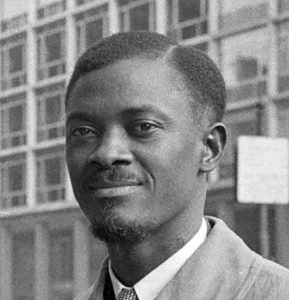
Patrice Lumumba (1925- 1961)
Having understood the concept of what an ideal Olóṣèlú should be, one must wonder how these concepts seem impracticable in Nigeria. From the formal amalgamation in 1914, Nigeria needed to grow in the same direction. The vision of those who took power from the colonial authorities must have been to raise the nation from what was left of it or what the colonial powers made of it. This is because the leadership problem had been evident even in the colonial period, as there were no close historical and sympathetical similarities between the persons in government and the governed. In 1958, Smythe, in his “The Problem of National Leadership in Nigeria,” captured the leadership challenge the country was facing and the need for better development in that area. However, the nation has been in different challenges up to contemporary days, making it look like the primary meaning ascribable to the word Òṣèlú is mere utopic euphoria. Òṣèlú includes the act of building a nation, and Olóṣèlú is supposed to take the position of the builders. It is the barest minimum expected from an average Nigerian politician.
To have real Olóṣèlú that would herald developments and progress in Nigeria, the nation needs to be more particular about ideological leadership, above mere political calculations that enthrone those with the means of getting to power over those with the ideological means required to wheel the nation forward. Figures like Haile Selassie of Ethiopia will always be referenced in the definition of reformative leadership, despite his shortcomings and identifiable imperfections in his years of ruling his country. Selassie heralded the need for modernisation across Ethiopia, encouraged the prioritisation of education to secure the future of his nation, and laid the foundation for democratic government. Selassie describes a politician, or Olóṣèlú, thus:
…throughout history, it has been the inaction of those who could have acted, the indifference of those who should have known better, the silence of the voice of justice when it mattered most, that has made it possible for evil to triumph.
In the same vein was Kwame Nkrumah of Ghana, who was a revolutionary and exercised his theories of political convictions towards a better standard of living for his people. Julius Nyerere of Tanzania, Nelson Mandela of South Africa, Jomo Kenyatta of Kenya, and other remarkable African leaders, including the celebrated champions of Nigerian democracy. Today, several politicians in Nigeria, especially from South Western Nigeria, claim to have subscribed to the political ideologies of Awoism, from the political conviction of the legendary Obafemi Awolowo, who canvassed for socialism and collective development of the people in general.
Ideological and reformative leadership are not phenomena of the past; neither are they mere descriptions or referential compensations for those who have fought for independence or democracy. It is a political state of things and does not need to elude a particular age but is sustained through the inherited customs of excellence. Nigeria’s lack of ideological leaders, without some philosophical chains of wants for the nation’s development, has only allowed chaotic missions by Nigerian politicians, shown by their usual excuses of underestimating the nation’s state, confusion, or utter irresponsibility.
The continuous reoccurrence of leadership challenges in the country, coupled with the high rate of corruption, embezzlement, and misappropriation of resources, has painted the word Òṣèlú in a bad light. Good leadership does not necessarily need to be a testimony of the past; it should be the state of mind of every politician and leader. However, the solution lies on the shoulders of the ìlú, the society, or the people. Nigerians must be conscious of who they vote for and desist from momentary hypes occasioned by deceits, sharing of garri, and as low as N1000 naira. Can we even get to that point where the garri is thrown back at their faces to mean that ìlú are no more gullible? How long do we compromise our rights and voices for things that will not help our generation? The solution must first go from the bottom before it gets to the top. By being conscious of these, we agree to know that all of us are Olóṣèlú, whether in the excellent reference of the word or bad contemporary ascriptions. See you in the next part.
Acknowledgement: Professor Duro Adeleke, a scholar of Yorùbá Studies at the University of Ibadan, a character of indomitable spirit, an incurable homiletician, and my herbalist with a frightening beard, made the inspiration to write this series possible.














You must be logged in to post a comment.